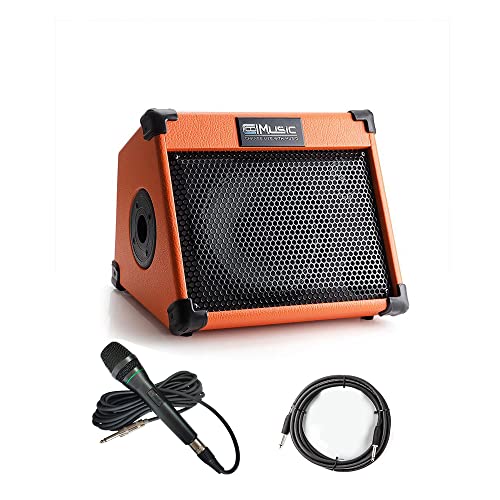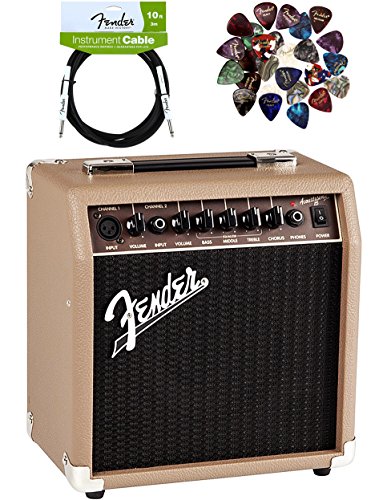TOP PICKS
Bestseller No. 1
Fender Acoustasonic Guitar Amp for Acoustic Guitar, 15 Watts, with 2-Year Warranty 6 Inch Speaker, Dual Front-Panel inputs, 11.5Hx11.19Wx7.13D Inches, Tan
- The Fender Acoustasonic Guitar Amplifier features 15 watts, 11.5Hx11.19Wx7.13D inches
- The Acoustasonic 15’s convenient dual front-panel inputs include a standard ¼ inch jack for an instrument and an XLR input for a microphone
- This unique amplifier is the only Fender guitar amp to feature a "whizzer" cone—a small supplementary speaker cone attached to the voice coil of the amps 6 inch speaker
- The portable and lightweight design allows for easy transport and its headphone output is a great solution for silent practice
- 2 Year Limited Warranty: Fender amplifiers are designed for players and built with unmatched quality, down to the last screw—Fender warrants this amplifier to be free from defects in materials and workmanship for two (2) years from original purchase
Bestseller No. 3
Boss Acoustic Singer Live 60-Watt Bi-Amp Acoustic Combo with FX
- Professional acoustic amplifier with premium sound and features
- Harmony function automatically creates smooth and accurate vocal harmonies via real-time key/chord analysis of the guitar input
- Chorus effect on guitar channel, delay/echo effect on mic channel, and independent reverb on both channels
- Dedicated guitar channel with Acoustic Resonance to restore natural tone to stage guitars with piezo pickups
SaleBestseller No. 4 −6%

Acoustic Guitar Amplifier, 20 Watt Bluetooth Amp for Guitar Acoustic with Reverb Chorus Effect, 3 Band EQ(Including Microphone and Audio Cable)
- 【2 Channel】It is able to plug in 2 different instruments together, such as guitar, microphone, etc.
- 【3 Band EQ 】3 Band Balance(Bass,Mid,High) meet the needs of various music style and the built-in reverb effect ensures natural and echo-like sounds
- 【Bluetooth】BT means Bluetooth.Provide with options of wireless connection, phone input, CD/MP3 input, and USB plugin, it is able to fit in the different connection types, it is convenient and useful with its master control, headphone input and DI output
- 【20 Watt】8- inch woofer and 2-inch tweeter can deliver a big, full and natural sounding for acoustic guitar and microphone,20 Watt has enough power for your needs, able to fit in different situations like live, studio, solo performance and practice, giving you more freedom to control your sound to be heard over the other musicians without pushing your amp out of its optimal operating range
- Effects: Reverb & Chorus; 15*14*13 inches midsize and 16 lbs allow a less burden performance
Bestseller No. 5

Coolmusic BP40D Powered Acoustic Guitar Amplifier- Portable Bluetooth Speaker 80W W/Battery with Reverb Chorus Delay Effect, 6 Inputs,3 Band EQ, Blue
- 【6 Inputs】4 musical instrument inputs and 2 auxiliary inputs, which can fully satisfy a small band. It can connect 2 instruments (guitar, piano, keyboard, etc.), 2 microphones, two mobile phones or computers at the same time. Two independent EQ effects adjustment , Boost or attenuate the low-frequency, mid-frequency and high-frequency DB values.
- 【80 Watt】Double 6.5- inch woofer and Double 2-inch tweeter deliver clear, lifelike ,dynamic, powerful sound; A 80 watt continue power amplifier pumps up the volume.
- 【Bluetooth】: Compatible with most BT devices, such as smartphone, tablet, laptop and so on, you can play accompaniment music while do guitar practice or enjoy the fun of music listening.
- 【Rechargeable】It can run up to 6-8 hours depends on the volume you use after 5 hours charge. And it can work with a connection directly to the electricity.
- 【Condenser microphone switch】: The microphone interface is designed with 48V phantom power, compatible with condenser microphones and dynamic microphones.
Bestseller No. 7
BOSS Acoustic Singer Live LT Guitar Amp (ACS-LIVELT)
- Professional acoustic guitar amp with premium sound and features
- 60–watt bi-amp design with custom-designed 6. 5-inch woofer and dome tweeter
- Guitar and mic channels with discrete analog input electronics and independent three-band EQs
- Acoustic Resonance (three types) on guitar channel restores natural tone to stage guitars with piezo pickups
- Enhance effect on mic channel for full, well-defined vocal tones
BUYING GUIDE
An acoustic guitar amplifier is designed specifically to accurately amplify the delicate and nuanced sound of an acoustic instrument. Unlike electric guitar amps, which can color and distort the sound, acoustic amps aim to reproduce the sound as faithfully as possible. If you’re a performer who uses an acoustic guitar, finding the right amp can make a significant difference to your sound. This guide aims to help you make the best choice for your needs.
1. Power Output: Amp power is measured in watts. The larger the venue you’re playing in, the more power you’ll need. A 10-20 watt amp might be sufficient for practicing at home or playing in small venues, but for larger venues or performances with a full band, you may need an amp with 50 watts or more.
2. Channels and Inputs: Some amps come with multiple channels, allowing you to plug in more than one instrument or a microphone. This can be very useful if you sing while playing, or if you switch between multiple instruments during a performance.
3. Tone Controls and Effects: Most acoustic guitar amps will have basic tone controls like bass, mid, and treble. Some may also include built-in effects such as reverb and chorus. While these can add to your sound, remember that the main aim of an acoustic amp is to reproduce your guitar’s natural sound as accurately as possible.
4. Speaker Size: The size of the amp’s speaker can affect its sound. Larger speakers will produce more bass and volume, while smaller speakers may provide a more focused sound. The choice will depend on your personal preference and the type of music you play.
5. Portability: If you play a lot of gigs, you’ll want an amp that’s easy to transport. Look for features like a sturdy handle, and consider the weight of the amp. Some amps may also have battery power options, which can be a lifesaver for outdoor gigs where power outlets are scarce.
6. Direct Out: This feature allows you to send your signal directly to a PA system or recording interface. It’s essential for playing larger venues where the amp alone may not provide enough sound coverage.
7. Feedback Control: Acoustic guitars can be prone to feedback when amplified. Some amps come with feedback control features that can help to reduce this problem.
8. Brand and Reviews: Finally, consider the brand’s reputation and read reviews from other users. This can give you an idea of the amp’s reliability and longevity.
Finding the right acoustic guitar amplifier involves considering your individual needs as a musician. By keeping in mind the factors above, you’ll be able to select an amp that not only amplifies your sound but also complements your playing style and enhances your performance.










